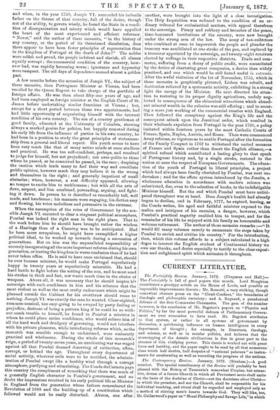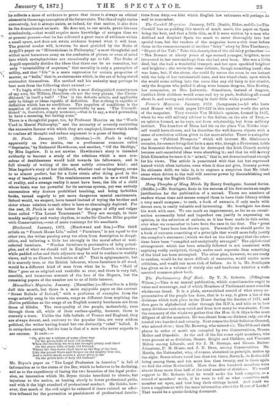The Contemporary Review. January, 1872. (Strahan.)—A good number. The special
constituency of the Review will probably be best pleased with the Bishop of Tasmania's somewhat Utopian, but attrac- tive, dream of a future Church in which all Protestant sects shall unite on the basis of the doctrine of Christ—not the doctrines about Christ— in which the preacher, and not the Church, shall be responsible for his individual teaching, and ritual shall be regarded and employed only as a method of stirring men's hearts towards God. They will like, too, Mr. Calderwood's paper on " Moral Philosophyand Savage Life," in which
be collects a mess of evidence to prove that there is always an ethical element in thesavage conception of the future state. The idea of right varies excessively, but it always exists, as indeed, for that matter, it also does in the domesticated animals. He does not, to our minds, prove his case conclusively,—that would require more knowledge of savages than we at present possess—but he had collected a great mass of evidence within a small space, and does not strain evidence beyond what it will bear. The general reader will, however, be most gratified by the Duke of Argyll's paper on Hibernicisms in Philosophy," a most thoughtful and withal most humorous essay on the confusion of phrase or even of mind into which metaphysicians are occasionally apt to fall. The Duke of Argyll especially derides the ideas that there can bo no causation, but only "invariability of sequence," that morality is only a perception of utility, and that "life" is a mere expression for certain properties of matter, as "bulls," that is, as statements which, in the act of being stated contradict themselves. His method and his audacity may perhaps be best seen from the following short extract :—
" To begin with—and to begin with a most distinguished countryman
of my own, Sir William Hamilton—is not the very phrase, the Uncon- ditioned,' in itself a bull? ' The' is the definite article, and applicable only to things or ideas capable of definition. But nothing is capable of definition which has no conditions. The negation of conditions is the negation of existence, as alone conceivable by man. The Uncondi- tioned' is, therefore, simply nonsense,—that is to say, a word pretending to have a meaning, but having none."
There is a thoughtful paper, too, by Professor Maurice on the "Words Used in Mental Philosophy," and the necessity of severely restricting the excessive licence with which they are employed, licence which tends to confuse all thought and reduce argument to a game of fencing.











































 Previous page
Previous page